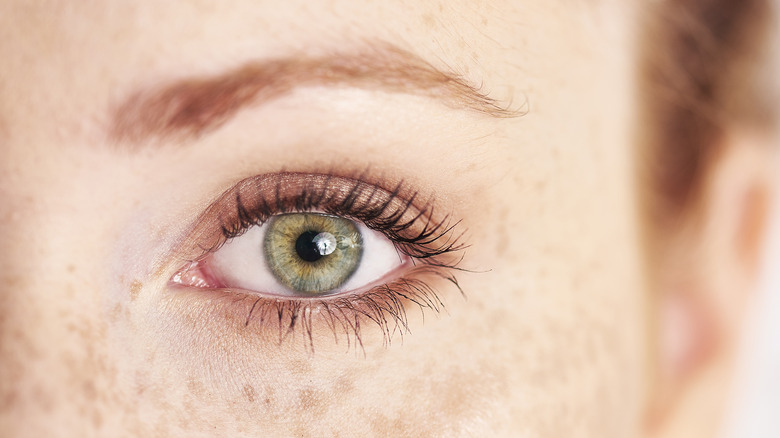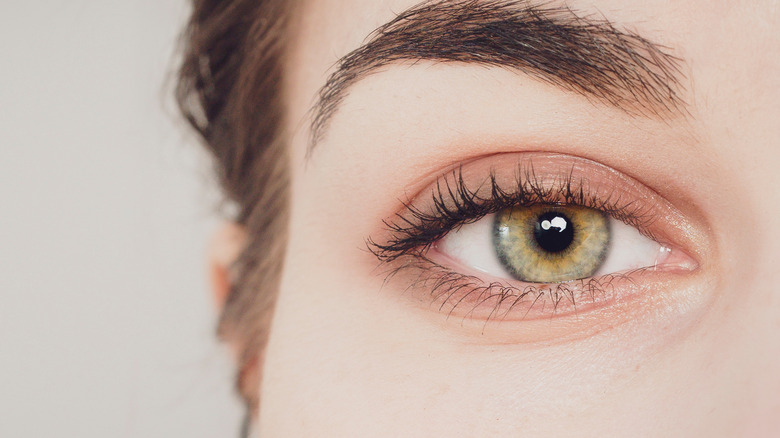What Green Eyes Can Predict About Your Health
Just 2% of the world population has green eyes, and most of them live in Northern, Central, and Western Europe — particularly in Ireland and Scotland, according to MyVision. Though they're more common in certain locations, anyone can have green eyes: For instance, while green eyes are particularly rare in Asian countries, two-thirds of people in Liqian in western China have green eyes (via Lasik Omaha).
Sixteen genes determine your eye color. Compared to brown eyes, green eyes have less melanin, which is a pigment on the outer ring of the iris. While we might admire the beautiful color of green eyes, they actually don't have any green pigment in them at all — they simply have less melanin than darker-colored eyes. The green color that you perceive results from light scattering out of the iris.
Although green eyes don't affect your personality, survey data suggests we often connect green eyes with qualities like creativity and trustworthiness, per Essilor. And apparently, many of us would love to have green eyes – Lens.com notes that green is one of the more popular contact lens colors. But while the appeal of green eyes is undeniable, having naturally green eyes can increase your risk for certain health conditions.
Green eyes could put you at greater risk for eye-related conditions
Because lighter-colored eyes have less pigment to protect them, they are more sensitive to UV-related sun damage, notes Mark R. Mandel, MD. In turn, this might contribute to eye-related conditions.
When more light penetrates the eye, it can make you more susceptible to macular degeneration. This is when your eye's cells deteriorate and you lose your vision. Other risk factors for macular degeneration include your age, genetics, smoking, a diet containing low amounts of leafy greens and omega-3 fatty acids, and physical inactivity (per Enhanced Vision). Though a 2014 systematic review in the International Journal of Ophthalmology found that existing research does not confirm that people with lighter-colored eyes are at a greater risk for macular degeneration, the authors point out that "there are plausible hypotheses supporting [lighter] iris color as a risk factor for age-related macular degeneration." More research is needed to confirm this possibility.
Though people with brown eyes are more likely to develop cataracts, people with blue or green eyes are more prone to eye melanoma. Your risk of eye melanoma increases with age, and certain genetic mutations also factor into your risk of eye melanoma. Exposure to UV rays from the sun or the tanning bed could also increase your risk of eye melanoma, according to the Mayo Clinic.
Eye protection is important for everybody, regardless of eye color. To best guard your eyes from sun damage, choose sunglasses that wrap around your eyes and have 100% UV protection. It also helps to limit your limit your time in the sun and wear a hat with a brim (via Optima Eye Care).
Green eyes might be associated with skin cancers
Because people with green eyes often have fair skin, per MyVision, that can tend to make them more prone to certain types of skin cancers. According to Cancer Research UK, people with light skin have less melanin in their skin to protect them from the sun.
Basal cell carcinoma, squamous cell carcinoma, and melanoma are three types of skin cancer (per Mayo Clinic). Basal cell carcinoma looks like a pearly or waxy bump or a bleeding sore that appears on areas of your skin that have been exposed to the sun. Squamous cell carcinoma also appears on sun-exposed skin, but it will resemble a red nodule or a crusty, flat lesion. Melanoma can occur at any place on the body, and not necessarily on sun-exposed areas. Melanoma can appear as an abnormal or changing mole, a lesion with an irregular border and different colors, or painful lesions.
A 2022 study in Cancer Causes & Control followed the health of more than 35,000 men. After 19 years, the men with hazel, green, or medium eye colors were found to have had a higher risk of developing basal cell carcinoma and squamous cell carcinoma compared to people with darker eye colors. However, the study found that eye color had no association with the risk for melanoma.
You can protect yourself from skin cancer — especially if you have fair skin — by applying broad-spectrum, SPF 30 sunscreen on exposed skin, wearing sun-protective clothing, and seeking shade (or avoiding the sun) between 10 a.m. and 2 p.m., when the sun is the strongest (via American Academy of Dermatology Association).
Are green eyes associated with better tolerance for pain?
Some research has sought to study whether or not the color of your eyes could indicate how much you tolerate pain. A 2014 pilot study in the Journal of Pain studied the pain tolerance of 58 pregnant women who were about to give birth. The researchers found that the women with darker eyes had greater anxiety compared to the women with green and blue eyes. They also had slightly more sleep disturbances and negative thoughts than the pregnant women with lighter eyes, though there weren't significant differences. During labor, the light-eyed women experienced less pain during childbirth than the dark-eyed women — though it's important to note that the differences weren't statistically significant because of the small sample size.
However, a later study published in the Journal of Endodontics in 2018 compared the perceived pain of 133 women with dark eyes to 167 with light eyes who received dental injections. This study found no differences between groups in their perception of pain. So, it seems that the jury is still out on whether or not there's a meaningful relationship between pain tolerance and eye color.




